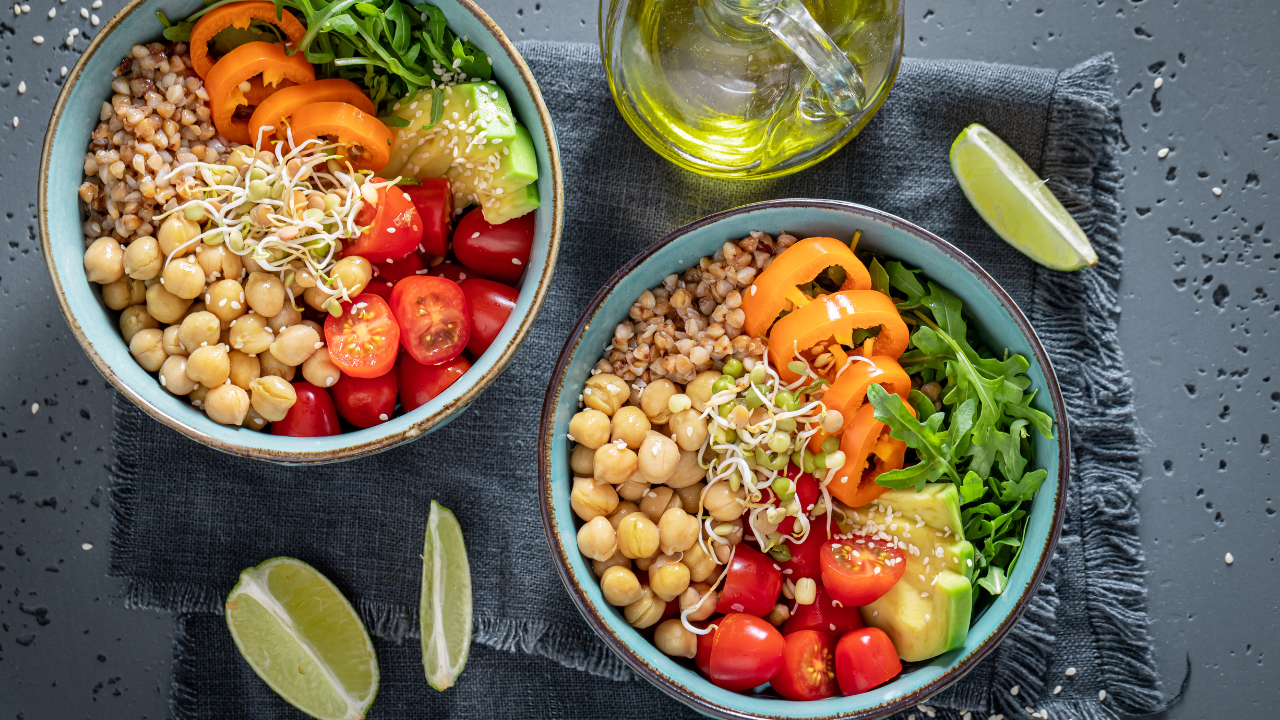Meal Planning as an Intuitive Eater
When you hear meal planning, what do you picture? If you’ve been a victim of diet culture, you might shudder when you hear the words “meal planning” as you picture endless hours and money spent. Don’t worry, meal planning does not have to look like that! Meal planning can actually be a very helpful tool on an intuitive eating journey.
If this is your first time here - hello and welcome! My name is Hannah and I am a non-diet dietitian with a mission of helping people ditch the diets and make peace with food.
In this blog we will cover:
What is meal planning?
The benefits of meal planning
Meal planning vs. meal prepping
Meal planning vs meal plans
Meal planning as an intuitive eater
Signs of diet-y meal planning
Meal planning steps
What is meal planning?
Meal planning simply involves making a plan of what meals and snacks you want to make before going to the grocery store. Meal planning looks differently for everyone and may even look differently from week to week.
I always describe meal planning as a spectrum. There are some people on one end of the spectrum who find it helpful to plan out every single meal and prep all of their meal before the week. Others find this method to be very overwhelming and time consuming and their preferred version of meal planning falls elsewhere on the spectrum. And that is okay! Meal planning is meant to alleviate stress, not make your life more stressful.
The benefits of meal planning
There are quite a few benefits to non-diet-y meal planning.
Helps you to apply gentle nutrition.
Limits decision fatigue during the week.
Makes grocery shopping a breeze.
Save money.
Save time.
Helps you to incorporate more variety - makes food fun!
Puts you in the driver's seat of your food choices.
Decreased food waste.
Meal planning vs. meal prepping
As previously mentioned, meal planning is simply making a plan of meals and snacks for the week. Meal prepping, on the other hand, is the act of preparing meals, dishes, and/or ingredients ahead of schedule. Meal planning is often the first step of meal prepping. Just like meal planning, the degree to which you meal prep is dependent on your lifestyle, goals, budget, and time.
Meal planning vs. meal plans
As a dietitian, people often ask me for meal plans. They say things like “Will you please just tell me what the heck to eat?”
A meal plan is a list of meals that you are encouraged to eat. These are sometimes created by dietitians and other nutrition professionals or simply downloaded off the internet. Meal plans are inflexible and often not a good fit for intuitive eaters or those learning to adopt intuitive eating. This is why I no longer give out meal plans. Meal plans have this perceived need to "stick to it", whereas with meal planning, you can be much more flexible and cannot "fail". Again, meal planning is whatever you want it to be!
Meal planning as an intuitive eater
A big part of intuitive eating is learning to identify what sounds good and what would best serve your body in the moment, so it may seem like intuitive eating and meal planning would clash. While intuitive does technically involve eating what you want, when you want it - this is not always practical. Most of us don't have the time to prepare our situational "perfect meal" every time we eat. Similarly, most of us don't have the funds to create or order in our "perfect meal" every time we eat either.
Meal planning helps us to make informed and empowered food choices. When we start to notice our hunger cues, we only have so long to find food before all rationale goes out the window. Meal planning can help to decrease some decision fatigue so you know what options you have when you start to feel hungry.
If your gut reaction of meal planning is that it feels dieting, I challenge you to think about your reason for meal planning. If it is to limit your calorie intake or take away from having to make any food decisions, you may still be in the dieting mindset. If your reason for meal planning is to help alleviate stress, incorporate gentle nutrition, decrease mindless eating, and improve satisfaction, you just might be an intuitive eater!
Signs of diet-y meal planning
As previously mentioned, meal planning and intuitive eating can go hand in hand. However, if you are still in the diet mindset, your meal planning intentions may be rooted in dieting and restriction. Here are some signs that your reasons for meal planning may benefit from some evaluation.
Meal planning is viewed as a set of rules to follow and it is inflexible. You might feel as though there is a "right" or "wrong" way to meal plan or prep.
You are only planning/prepping foods that meet a set of diet rules (i.e. low carb, low calorie, etc.)
You are not considering your preferences and what actually sounds good.
Meal planning and prepping involves weighing and measuring every single ingredient so it "fits your macros" or calorie goal.
You find yourself feeling bad or guilty if the meal plan is not followed "perfectly".
You are only meal planning because it helps to have "safe" foods ready to eat.
Feel like I just described you? That’s okay! If you have been dieting for a long time, it makes sense that you would gravitate towards making meal planning a diet behavior. Use this as time to reflect on your intentions and actions.
If you’d like more help breaking free from the diet cycle, check out The Nutrition Reboot Membership. This is my private intuitive eating club for ex-dieters looking for more support and structure.
Meal planning steps
Ready to begin meal planning or jazz up your current routine so it works better for you? Follow these steps to get you started (p.s. these steps are not meant to be rules! Use them as you see fit and don’t forget to be flexible).
Identify which meal(s) you struggle with the most during the week. Make these the meals that you plan for.
Choose 2-4 recipes to make for the meals that you identified. Take your time and budget into consideration. Choose 1-2 new recipes regularly to incorporate variety (maybe a new recipe each week or each month). If using a go-to recipe, switch up the spices, condiments, etc. to enhance variety factor. It might also help to plan for leftovers, if you enjoy them.
Take inventory of what you already have available.
Make a grocery list of items that you need for the recipes and other meals or snacks you intend to eat.
Have plenty of shelf-stable and frozen options on hand for busy days or days when your planned recipes don't sound as good.
Nutrition may be part of your decision making, but ensure that it is gentle nutrition. Meal planning is so much easier without all the food rules!
Bottom line
Meal planning can be a very helpful sidekick on your intuitive eating journey. Having a plan of your meals and snacks can help to to better honor your hunger and make food choices that are satisfying.






























































